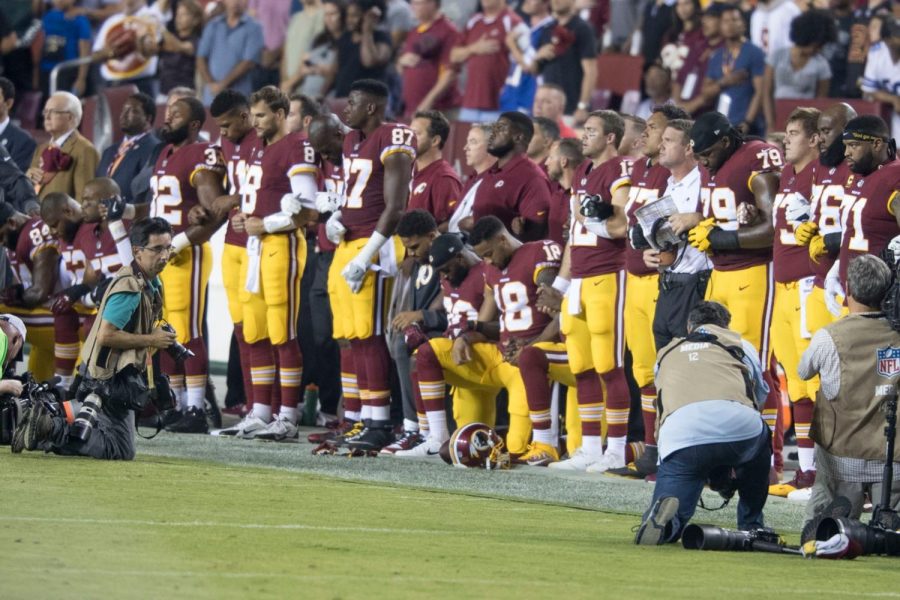I was wrong: athletes should have political opinions
Washington Redskins players kneel and link arms during the national anthem in protest against racial injustice. The protests, inspired by Colin Kaepernick, have been heavily criticized by President Donald Trump. Photo courtesy Keith Allison.
October 2, 2017
Last year, I wrote an article arguing that athletes shouldn’t endorse political candidates and suggesting that they shouldn’t involve themselves in politics in general. I asserted that athletes had “almost no qualifications to legitimize” their political opinions and that for that reason, their endorsements were “irresponsible.”
It’s become abundantly clear that I was dead wrong. In the past week, President Trump’s attacks on athletes protesting against racial injustices and their subsequent displays of unity have served as an important reminder that it’s not only justified but entirely necessary for athletes to use their platform to spread critical—and sometimes political—messages.
Before I go any further, I should admit that all of this is superficial: to get caught up in the theater of Trump’s comments is to fail to recognize the important issue of racism and police brutality that these athletes are fighting against. This is why it’s more important than ever that we allow and encourage athletes to protest and speak out.
Still, it’s a striking and even comical irony that by criticizing the NFL athletes protesting during the national anthem, Trump made their acts of defiance all the more meaningful. In making vulgar and offensive statements about the protests, Trump publicized the issues that these athletes fight for and helped their cause.
Opponents of the protests had somewhat succeeded in silencing former quarterback Colin Kaepernick, who failed to find a spot on an NFL team this year after he took a knee to take a stand against racism. Now, Kaepernick is more powerful than ever.
In fact, NFL ratings have actually gone up as interested citizens tune in to see how football players will respond. As demands from the right-wing media for an “NFL boycott” multiply and Trump claims argues that kneeling is costing the NFL money, I’ve even started to see the act of watching football as a small form of protest against Trump.
Kaepernick-inspired protests, previously confined to a sprinkling of outspoken members of the football community, have now spilled into other major sports. Baseball players have taken similar actions and both hockey and basketball players have expressed support and intention to follow—including basketball superstar Stephen Curry, who made a political statement of his own with his recent refusal to visit the White House with his NBA champion Golden State Warriors.
As far as the qualifications go, there’s no reason athletes can’t be informed activists. Sure, they probably won’t be policy experts, but that’s no more a prerequisite for them than it is for a typical protest leader.
I previously claimed that politics should remain entirely separate from sports, regardless of the position expressed. But it’s fine for politics to spill into our entertainment. These athletes can and should protest and have been impressively responsible about keeping their methods peaceful and respectful.
Athletes are entertainers, but they still have every right to also be social and political commentators. Let’s keep it that way.








Anonymous • Oct 3, 2017 at 9:44 pm
The issue is not correctly interpreted in this article. It has nothing to do with Donald Trump not believing in racism or being racist himself. It has to do with the fact that defaming our flag and our country does nothing to solve problems. Yeah, it calls attention to those players, but is it really leading to viable solutions and actions? The answer to solving racial divides is not to condemn our nation. That is reactive and only focusing on the past. The liberal response is “our country was founded on racism”. Every single country in the entire world founded before the 1800s had both slavery and racial inequalities. Should we just not support any countries? Should no one stand for the German anthem ever because there may still be Neo-Nazis in the country and they had Hitler in the 1940s? How is that logical?
anonymous • Oct 3, 2017 at 10:47 am
There are a few issues I have with this article. The first being that NFL ratings have actually decreased by 10% since the protests. From 17.6 million (2016) down to 15.8 million views (2017). Secondly, Trump is not slamming these athletes for standing up for racial injustices. He is fighting for the American flag. Whether you believe in this or not does not make it right to lie about what Trump is standing up for. I agree that athletes should use their platforms to stand up for what they believe but that goes the same about the conservative views.
Hypocrite • Oct 2, 2017 at 5:23 pm
In other words you are saying that athletes can express themselves politically, as long as they are not expressing conservative views. But if they spit on the flag and everyone who has fought for it, then it’s all good. Makes sense